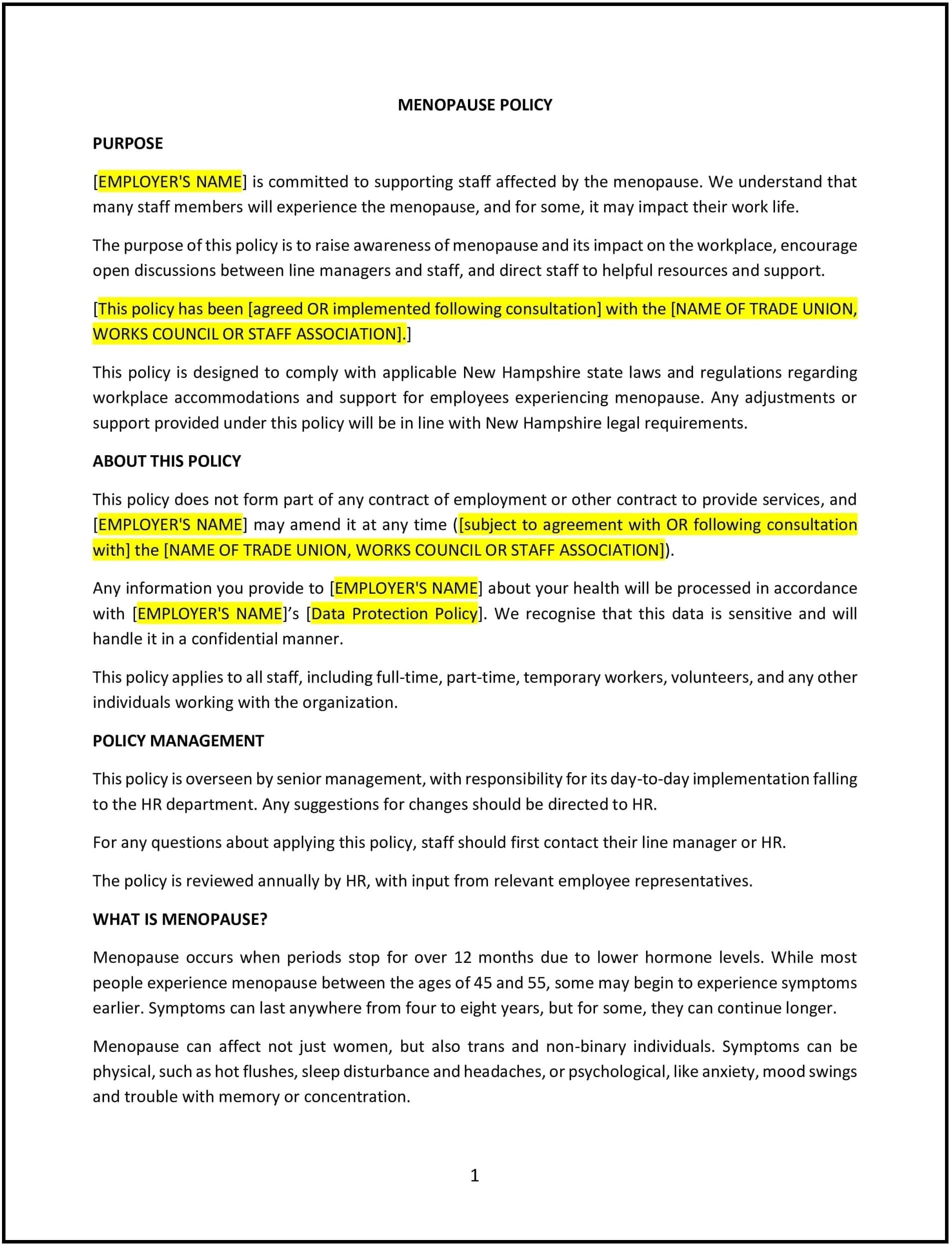Got contracts to review? While you're here for policies, let Cobrief make contract review effortless—start your free review now.

Customize this template for free
Menopause policy (New Hampshire)
A menopause policy helps New Hampshire businesses support employees who may be experiencing menopause or perimenopause, by providing an inclusive and understanding environment. This policy outlines the company’s approach to recognizing and addressing the physical, emotional, and psychological impacts of menopause, ensuring that employees receive the necessary support to continue working effectively during this stage of life.
By adopting this policy, businesses can create a more inclusive workplace, support employees’ health and well-being, and foster an environment of respect and understanding.
How to use this menopause policy (New Hampshire)
- Define menopause and perimenopause: Provide clear definitions of menopause and perimenopause to ensure that employees understand the scope of the policy and recognize the stages of menopause.
- Offer flexibility: Provide flexible work arrangements, such as adjusted hours, the ability to work from home, or temperature control options, to accommodate employees who may be experiencing symptoms of menopause.
- Address health support: Encourage employees to seek medical advice and support if needed and offer resources such as employee assistance programs (EAPs) or health benefits that cover menopause-related care.
- Raise awareness: Provide information and training for all employees, including managers, to increase awareness and reduce stigma surrounding menopause in the workplace. This can help create a more supportive and understanding environment.
- Promote open communication: Foster a culture of open communication where employees feel comfortable discussing their needs related to menopause. Ensure that employees know how to request support, whether it’s related to flexible working or other accommodations.
- Maintain confidentiality: Respect employees' privacy by keeping menopause-related conversations and accommodations confidential, ensuring that any personal information is shared only with necessary parties and with the employee’s consent.
- Regularly review the policy: Continually evaluate the effectiveness of the policy, making adjustments as needed based on feedback from employees or any changes in legal or regulatory requirements.
Benefits of using this menopause policy (New Hampshire)
This policy offers several benefits for New Hampshire businesses:
- Supports employee health and well-being: By providing accommodations and resources, businesses can help employees manage menopause symptoms effectively, reducing stress and promoting well-being.
- Increases workplace inclusivity: A menopause policy fosters a more inclusive and supportive workplace where employees feel valued and understood, contributing to better morale and engagement.
- Improves employee retention: By supporting employees through menopause, businesses can retain experienced staff, reduce turnover, and maintain a productive workforce.
- Demonstrates commitment to equality: Implementing this policy shows that the company is committed to gender equality and the health and well-being of all employees, regardless of age or gender.
- Enhances productivity: Providing employees with the flexibility and support they need during menopause can help them remain focused and productive, minimizing any disruptions to business operations.
Tips for using this menopause policy (New Hampshire)
- Communicate the policy clearly: Make sure all employees are aware of the policy, how to access support, and the accommodations available to them. This can be done through training, employee handbooks, or company-wide communications.
- Offer training to managers: Ensure that managers understand the impacts of menopause and are equipped to provide appropriate support and accommodations, maintaining a supportive work environment.
- Create a supportive environment: Foster a culture of understanding and openness, where employees feel safe discussing their needs and can access support without fear of stigma or discrimination.
- Encourage feedback: Regularly solicit feedback from employees on the effectiveness of the policy and make any necessary adjustments to ensure that it continues to meet their needs.
- Ensure compliance with health benefits: Review your health benefits to make sure they cover menopause-related treatments, counseling, and other health services that may be beneficial to employees experiencing symptoms.